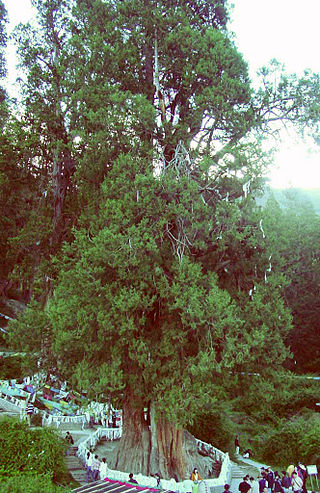
The Paria River is a tributary of the Colorado River, approximately 95 miles (153 km) long, in southern Utah and northern Arizona in the United States. It drains a rugged and arid region northwest of the Colorado, flowing through roadless slot canyons along part of its course.

The Tibetan brown bear, also known as Tibetan blue bear, is a subspecies of the brown bear in the eastern Tibetan Plateau.

The southern pochard is a species of duck, and a member of the genus Netta. There are two subspecies, the South American (southern) pochard N. e. erythrophthalma and the African (southern) pochard N. e. brunnea.

Ekrixinatosaurus is a genus of abelisaurid theropod which lived approximately 100 to 97 million years ago during the Late Cretaceous period. Its fossils have been found in Argentina. Only one species is currently recognized, Ekrixinatosaurus novasi, from which the specific name honors of Dr. Fernando Novas for his contributions to the study of abelisaurid theropods, while the genus name refers to the dynamiting of the holotype specimen. It was a large abelisaur, measuring between 6.5 and 8 m in length and weighing 800 kg (1,800 lb).

Zopherinae is a subfamily of beetles, commonly known as ironclad beetles. Together with the subfamily Usechinae, they have been treated historically as a family, but have recently been joined by several additional taxa, making the Zopheridae a much larger composite family, and the Zopherinae are now only a small component within it, consisting of seven genera in the tribe Zopherini and one, Phellopsis in its own tribe (Phellopsini).

The monjon is the smallest species of rock-wallabies (Petrogale) and is found in north-west Australia. They are restricted to a small area of the Kimberley region and on nearby islands in the Bonaparte Archipelago. Common names also include Burbidge's rock-wallaby and Burbidge's rock-weasel.

Cupressus gigantea, the Tibetan cypress, is a species of conifer in the family Cupressaceae in Asia. C. gigantea was previously classified as a subspecies of Cupressus torulosa because of their similar morphological characteristics and close distribution, but have since been genetically distinguished as separate species.

The Ladak pika, also known as the Ladakh pika, is a species of mammal in the family Ochotonidae found in China, India, and Pakistan. Prior to identification as a separate species, specimens were thought to be of the plateau pika. Named for the Ladakh region, they are commonly found in valleys of the mountain ranges spanning from Pakistan through India to China at an elevation between 4,300 and 5,450 m and are herbivores.

Paracotalpa deserta is a beetle in the family Scarabaeidae.

Paracotalpa puncticollis is a beetle of the family Scarabaeidae. Commonly referred to as the Punctate Little Bear, they range from California to New Mexico. It is usually found in piñon-juniper ecosystems where it feeds on juniper leaves. Little research has been published on the species, with the last journal article being published in 1972. P. puncticollis biology is poorly understood, but it appears to be active between February and May, with peak activity occurring in April.

Laxta granicollis, the bark cockroach, is a species of Blaberidae that occurs in Australia. The female of this species lacks wings while the male is winged.
The Huanchaca mouse or Huanchaca akodont is a rodent species in the family Cricetidae. It is known from savannas in an area at an elevation of 700 metres (2,300 ft) in Serrania Huanchaca, Noel Kempff Mercado National Park in eastern Bolivia.

Zopherus is a genus of beetles comprising 19 species. They live in the Americas and are adapted to wood-boring.
Osmunda wehrii is an extinct species of fern in the modern genus Osmunda of the family Osmundaceae. Osmunda wehrii is known from Langhian age Miocene fossils found in Central Washington.

Penghu 1 is a fossil jaw (mandible) belonging to an extinct hominin species of the genus Homo from Taiwan which lived in the middle-late Pleistocene. The precise classification of the mandible is disputed, some arguing that it represents a new species, Homo tsaichangensis, whereas others believe it to be the fossil of a H. erectus, an archaic H. sapiens or possibly a Denisovan.
Ctenisodes is a genus of ant-loving beetles in the family Staphylinidae. There are about 14 described species in Ctenisodes.
Acmaegenius is a genus of broad-nosed weevils in the beetle family Curculionidae. There are at least two described species in Acmaegenius.
Pseudorimus is a genus of broad-nosed weevils in the beetle family Curculionidae. There are at least two described species in Pseudorimus.
Zopherus granicollis is a species of ironclad beetle in the family Zopheridae. It is found in Central America and North America.
Eubrianax is a genus of water penny beetles in the family Psephenidae. There are about 12 described species in Eubrianax.















